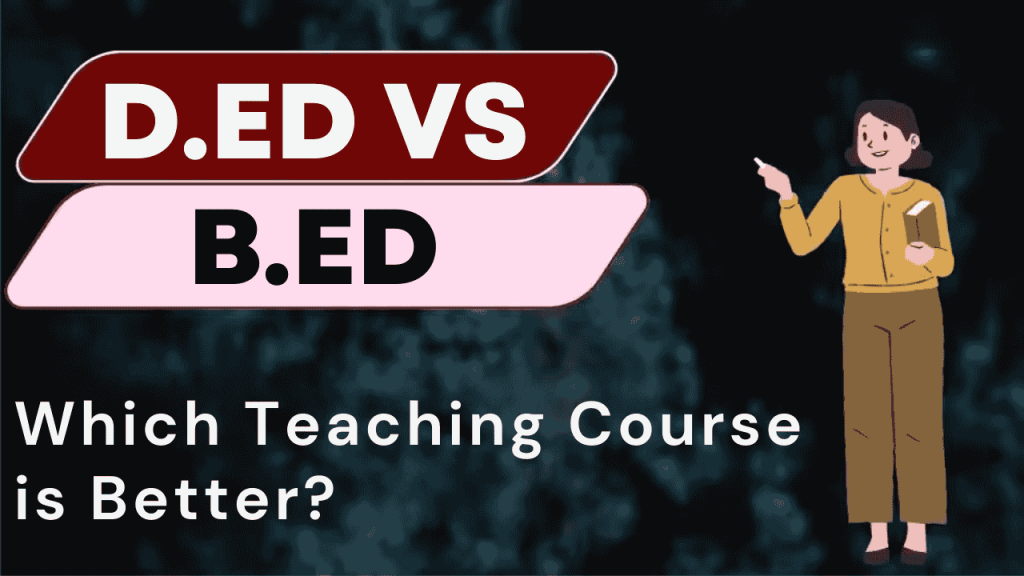
The students might get confused about which course to do after the 12th class or after graduation, if they are seeking teaching as a career. You might be thinking of choosing between the DED and BED courses. For this, the students must be aware of the eligibility for the course and then choose which one they want to do. Check these details below.
What is D.Ed?
D.Ed (Diploma in Education) is a diploma-level course designed for individuals who want to become primary school teachers. This course helps in understanding child psychology, classroom management, and teaching methodologies for young learners.
Key Details of D.Ed:
| Feature | Details |
|---|---|
| Full Name | Diploma in Education |
| Level | Diploma Course |
| Duration | 1-2 years |
| Eligibility | 10+2 (Higher Secondary) |
| Focus | Teaching at the primary level (Classes 1-5) |
| Job Roles | Primary School Teacher, Assistant Teacher, Tutor |
| Salary Range | Rs 2-3 lakh per annum (varies by experience & location) |
What is B.Ed?
B.Ed (Bachelor of Education) is a degree-level course required to become a secondary or higher secondary school teacher. This course focuses on advanced teaching techniques, subject knowledge, and educational psychology.
Key Details of B.Ed:
| Feature | Details |
|---|---|
| Full Name | Bachelor of Education |
| Level | Undergraduate Degree |
| Duration | 2 years |
| Eligibility | Graduation (BA, B.Sc, B.Com) |
| Focus | Teaching at the secondary & senior secondary level (Classes 6-12) |
| Job Roles | High School Teacher, Lecturer, Educational Consultant |
| Salary Range | Rs 3-6 lakh per annum (varies by experience & location) |
Major Differences Between D.Ed and B.Ed
| Factor | D.Ed | B.Ed |
|---|---|---|
| Level | Diploma | Undergraduate Degree |
| Duration | 1-2 years | 2 years |
| Eligibility | 12th Pass | Graduation |
| Focus Area | Primary Education | Secondary & Higher Secondary Education |
| Teaching Level | Classes 1-5 | Classes 6-12 |
| Job Scope | Limited to primary schools | Wider opportunities in high schools & colleges |
| Salary Expectation | Lower | Higher |
| Further Studies | Can pursue B.Ed | Can pursue M.Ed, PhD |
| Government Jobs | Can pursue M.Ed., PhD | Secondary & Senior Secondary Teacher in Govt. Schools |
Which Course is Better?
The answer depends on career goals and teaching preferences.
Choose D.Ed. If:
- Interest lies in teaching young children in primary schools.
- Eligibility criteria (10+2) are more suitable.
- Time is limited, and a shorter course (1-2 years) is preferred.
- Government or private primary school teaching jobs are the main focus.
- Lower investment in education is preferred before starting a job.
Choose B.Ed. If:
- The aspiration is to teach in secondary or higher secondary schools.
- A bachelor’s degree has already been completed (BA, B.Sc, B.Com).
- Higher salary packages and career growth in education are desired.
- Interest in specialization in subjects like Mathematics, Science, English, etc.
- Opportunities for higher education (M.Ed., PhD) are in mind.
Job Opportunities After D.Ed. and B.Ed
| Course | Job Roles | Government Jobs | Private Jobs |
|---|---|---|---|
| D.Ed | Primary School Teacher, Tutor, Assistant Teacher | Government Primary School Teacher | Private Schools, Coaching Institutes |
| B.Ed | Secondary School Teacher, Lecturer, Education Counselor | Government High School Teacher, PGT, TGT | Private Schools, Colleges, EdTech Companies |
- D.Ed graduates are eligible for primary teacher recruitment exams like CTET (Central Teacher Eligibility Test) and state-level TETs.
- B.Ed graduates can apply for TGT (Trained Graduate Teacher) and PGT (Post Graduate Teacher) positions in government schools after clearing exams like CTET, STET, and KVS/NVS recruitment.
Salary Comparison
| Experience | D.Ed Salary (Rs per annum) | B.Ed Salary (Rs per annum) |
|---|---|---|
| Fresher | Rs 2-3 lakh | Rs 3-5 lakh |
| 3-5 Years | Rs 3-4 lakh | Rs 5-7 lakh |
| 10+ Years | Rs 4-6 lakh | Rs 7-12 lakh |
- B.Ed holders generally earn more than D.Ed holders due to higher qualification levels and teaching in senior classes.
- Government teaching jobs offer fixed pay scales, while private institutions offer variable salaries based on experience.
Future Scope & Higher Studies
| Course | Higher Education Options |
|---|---|
| D.Ed | B.Ed, Diploma in Special Education |
| B.Ed | M.Ed, PhD in Education, EdTech Certification |
- D.Ed holders can later upgrade their qualification by pursuing B.Ed for better opportunities.
- B.Ed graduates can continue their studies with an M.Ed. or a PhD for career advancement.
Final Verdict: Which Course Should You Choose?
| Situation | Best Choice |
|---|---|
| Wants to become a primary teacher | D.Ed |
| Wants to teach in high school | B.Ed |
| Has only 12th pass qualification | D.Ed |
| Already completed graduation | B.Ed |
| Needs a faster way to enter the teaching field | D.Ed |
| Aims for higher salary & career growth | B.Ed |
- D.Ed is best for primary school teachers looking for a quick job entry.
- B.Ed is better for higher salary, better career growth, and teaching secondary school students.
- If unsure, pursuing D.Ed first and later doing B.Ed can be a good option.
Moving Forward
Both D.Ed and B.Ed are excellent choices for a teaching career. The course you want to choose depends on certain criteria, like which career you want to choose, who you want to teach, etc. Primary school teaching requires D.Ed., while secondary and higher secondary school teaching requires B.Ed.
For long-term career growth, B.Ed is a better choice due to higher salaries, promotions, and more job opportunities. However, if the goal is quick job placement in primary schools, D.Ed is the faster option.
Ultimately, both courses serve an important purpose in the education sector and help in shaping the future of students.









